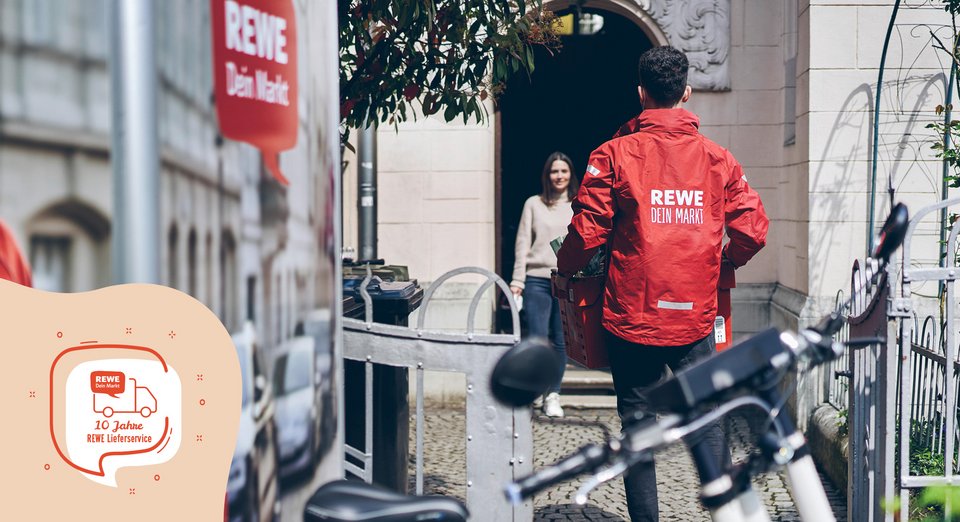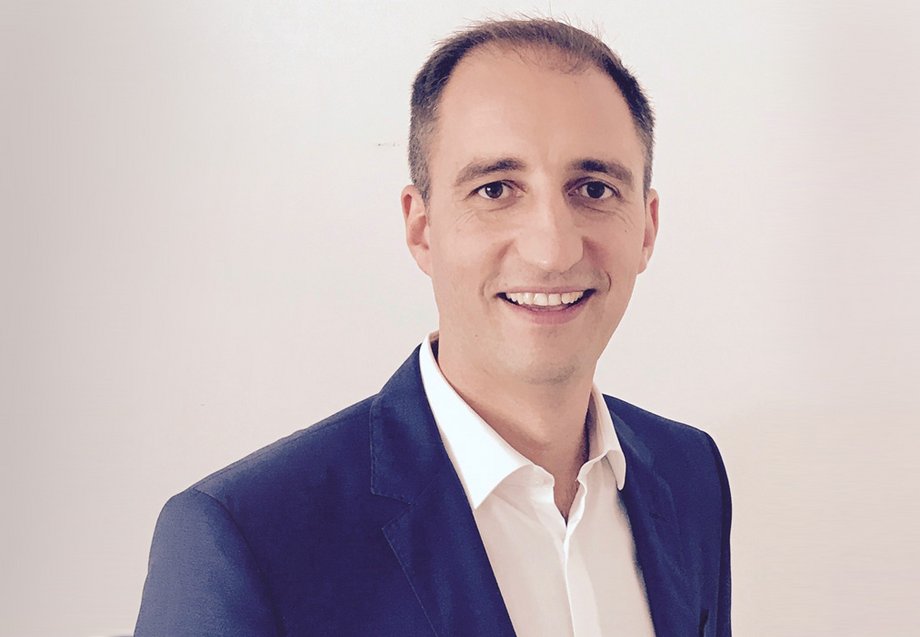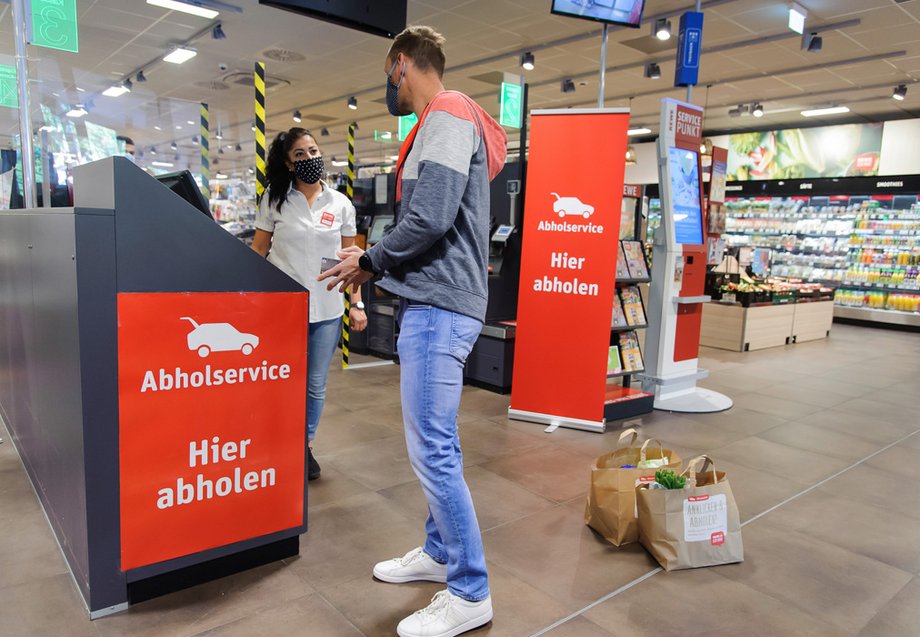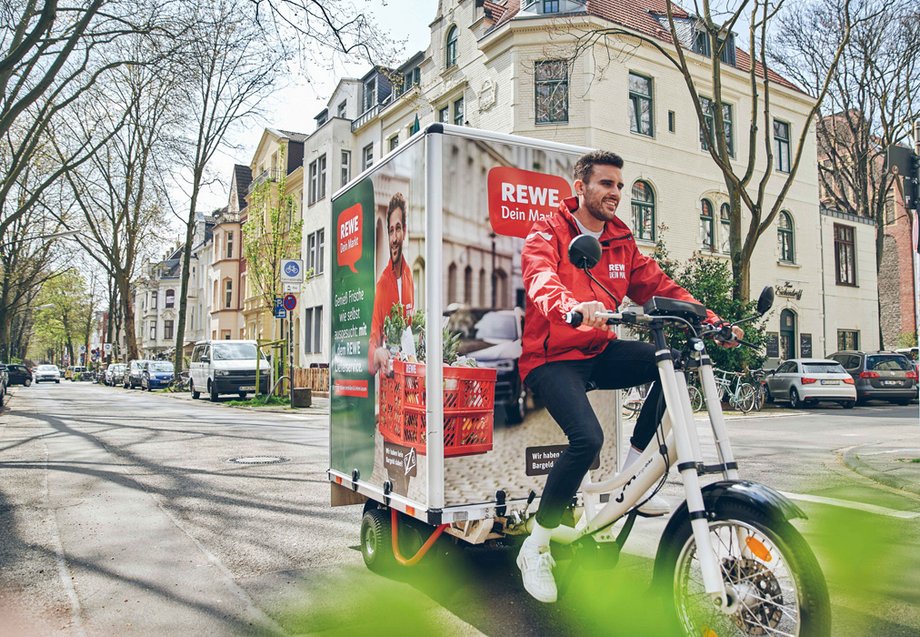
REWE took its first steps towards online grocery 10 years ago. In this interview, Managing Director Drasko Lazovic talks about the sustainability of the coronavirus effect, synergies with bricks-and-mortar retail and when he cycles to the grocery store.
one: Mr Lazovic, if you were to give a short speech to the REWE delivery service on the occasion of its 10th birthday: What would you say or wish for?
Drasko Lazovic: I compare the REWE delivery service and the pick-up service to having your own first child. You look forward to it, but you don't know what to expect. You accompany it, watch it grow and do everything you can to make it successful. And that's how it was with the REWE delivery service. At the beginning, a lot of things were hands-on, we tried out lots of things and learnt from our mistakes very quickly. Over time, you learn more and more - just like parents do. Now comes the next step. Our child has grown up. We can let go a little again and trust him more.
Let me give you two examples: In the beginning, we delivered from branches and received a lot of support in the regions. That was good for the start, but at the end of the day it wasn't effective because the online share in individual shops suddenly exceeded 50 per cent after just a short time. That's why we opened our first FFC in Hürth in 2014 with the active support of the West region. Before the opening, I was still putting bread on the shelves at four in the morning. At six o'clock, the warehouse manager came and took over. That's how it was back then. We are now much more professional and our numerous openings are very structured. Our child has grown up and developed very well.

one: You joined REWE Digital in 2014 as Head of Expansion, Networks and Formats. What was your subsequent path to becoming Managing Director Fulfilment Services?
Drasko Lazovic: I can still remember my first day very well. There was no real induction programme. I was immediately in the thick of things and talked to the Western Region about space for a warehouse. Bit by bit, I took on more and more responsibility and was heavily involved with expansion and different delivery formats. In between, I also supported my colleagues at BILLA Austria for a while with the planning and realisation of a warehouse. Now I've had overall responsibility for over three years. The delivery and collection service has grown steadily and the team has grown with it.
one: In your opinion, which technical developments were decisive for success? And which ones will be critical to success in the future?
Drasko Lazovic: There have been various technical improvements that have significantly improved the service for our customers. These include the introduction of live route planning, the implementation of our own order picking software and the automation of intralogistics. But above all, what has brought us forward and continues to do so are our employees. We have site managers, department heads, employees and colleagues at Carlswerk who have been with us from the very beginning. They identify strongly with the delivery and collection service and their commitment has brought us to where we are today. Of course, mistakes are also made when you are in unfamiliar territory. And that was the case for us in 2014. However, we have established a functioning error culture and we are still benefiting from this today. With REWE Markt and the regions, we always have experts and supporters at our side.
one: Online grocery is growing, but is still in the red. Why is it important to continue investing money in an industry that is not yet profitable?
Drasko Lazovic: In general, food has to be sold through all available channels in an increasingly differentiated market. When you set up something new, it costs money in 99 per cent of cases because you have to invest. We had no infrastructure, no picking software, no warehouse locations. That was the situation when we started. After all, we were the first in Germany to do it so professionally. We are still in the midst of development, and in the last 18 months alone we have opened over seven warehouse locations and 1,000 pick-up service stores. We have developed very well in recent years and are already operating profitably at individual delivery service locations. This is somewhat easier with the pick-up service compared to the delivery service, because the last mile is eliminated there. We have a lot of synergies between the pick-up and delivery service and this has helped us a lot during the coronavirus period to realise the expansion to over 1,600 pick-up service stores.

one: You mention the boost that Corona has brought to online grocery retail. How sustainable is this increase in sales?
Drasko Lazovic: Thanks to coronavirus, we now have an online share of around four per cent in the food retail sector across Germany. Most of this is generated in the major cities. There is definitely still potential there. Experts are currently forecasting an online share of between eight and up to twelve per cent in 2030. If you look at developments in other countries, this is not unrealistic. In South Korea, the share is already almost 20 per cent, in the UK it is just under ten per cent.
One thing is clear: we have grown enormously as a result of coronavirus and are still at a significantly higher level than in the pre-coronavirus era. We are also seeing constant growth. This shows that online grocery retail has established itself.
And the trend in online grocery is also moving towards individualisation. We can meet this desire for customised services very well in the online world and link it to bricks-and-mortar retail.
one: Where is the journey heading in terms of regional expansion? Where are the blank spots on the map that you would like to fill next?
Drasko Lazovic: We are the only retailer with 90 per cent online coverage. Nobody else can do that. We have expanded considerably and eliminated a few white spots. We are now finally in the Ruhr region. A logistics centre will soon be opening there in Bochum. We will also be opening one in Leipzig soon. Nuremberg and Stuttgart are already online. In addition to the expansion, we will also be extending our service in cities where we already have a presence.

„One thing is clear: we have grown enormously as a result of coronavirus and are still performing at a much higher level than in the pre-coronavirus era“

one: Quick commerce with its bicycle couriers has been on the rise in cities, especially in recent years. How important is the time factor? How quickly do customers want their purchases delivered today?
Drasko Lazovic : The importance of time has changed. Six years ago, we surveyed customers and the answer was: We're happy if the weekly shop arrives in two days. When we then introduced same-day delivery in 2017, customers accepted it very well. You can see the change in customer behaviour here and we are adapting to it. Technically, we can now deliver purchases in three hours.
However, it's important to differentiate between the delivery service and quick commerce, where the delivery should be made in ten minutes: The REWE delivery service and also the pick-up service are geared towards bulk shopping, the weekly shop. Quick commerce, as offered by many delivery services in large cities by bicycle courier, is geared more towards small purchases and therefore serves a completely different target group.

one: How sustainable is the delivery service today? There are always issues that also concern customers - be it the delivery vehicles or the packaging material.
Drasko Lazovic: Sustainability is a high priority for us. We benefit from the fact that we are part of the REWE Group, where many sustainable projects are established. What we are already doing in some cities is delivering by bicycle. We would like to expand this.
The issue of e-mobility is somewhat more complicated, as the goods have to be refrigerated, which requires a lot of energy. This means that the cooling limits the range of the vehicles, which means they can make fewer trips to customers. But we are also doing a lot of testing in this area and will now buy some electric vehicles. We have already largely switched the cooling concept from dry ice to ice packs.
Route planning is important in terms of Sustainability. We combine orders from the same area into one delivery route - in large cities, for example, there are very short routes where we deliver to many customers.
We also keep an eye on the issue of food waste. Like the REWE stores, we also cooperate with food banks to avoid food waste. We are currently working a lot on the issue of packaging. We already have a reusable system for our collection service. In the long term, we also want to replace paper bags with reusable solutions for the delivery service.
one: Finally, a question about your shopping basket: which product do you order most frequently via the delivery service?
Drasko Lazovic: I prefer to order light, small and high-quality products, as this is of course best for the delivery service. But seriously: we traditionally order the weekly shop with lots of fruit, vegetables and sweets for the whole family. And if I've forgotten the milk again, I like to cycle to the local supermarket and quickly pick up a carton.

Both German and English comments appear here.
./magazine-article